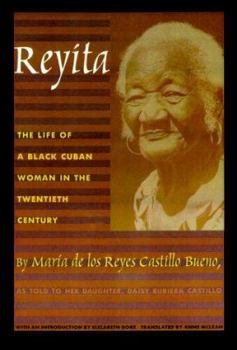Reyita: The Life of a Black Cuban Woman in the Twentieth Century
Select Format
Select Condition 
Book Overview
Mar a de los Reyes Castillo Bueno (1902-1997), a black woman known as "Reyita," recounts her life in Cuba over the span of ninety years. Reyita's voice is at once dignified, warm, defiant, strong, poetic, principled, and intelligent. Her story-as told to and recorded by her daughter Daisy Castillo-begins in Africa with her own grandmother's abduction by slave-traders and continues through a century of experiences with prejudice, struggle, and change...
Format:Paperback
Language:English
ISBN:0822325934
ISBN13:9780822325932
Release Date:November 2000
Publisher:Duke University Press
Length:192 Pages
Weight:0.59 lbs.
Dimensions:0.6" x 5.6" x 8.3"
Customer Reviews
2 ratings
An interesting sociological document, if not a very good piece of literature
Published by Thriftbooks.com User , 18 years ago
Reyita describes her life as a black woman, being born in 1902 and growing up through all the violence and poverty of Cuba in the twentieth century. In 1912 Reyita, was living with her godfather and his wife, the latter being terribly abusive. This lady was also head of the women's section of the local branch of the leading Afro-Cuban political party, the PIC. The PIC had been formed in 1908 in order to fight against racial discrimination. It was been banned by the Cuban government in 1910 on the false ground that it was anti-white. As a result of what Reyita claims was a trap laid by the Cuban president Jose Miguel Gomez, the PIC launched a revolt. The Cuban military responded by executing and torturing thousands of ordinary Afro-Cubans. Reyita's aunt was arrested on bogus charges and thrown into prison. Reyita spends a great deal of time in this book discoursing her use of herbal remedies and other home-grown medicine to cure various ailments of her neighbors. In this way, as a medicine woman, also as one with a reputation as receiving accurate visions from the spirit world, she found a certain niche for herself in Cuba's patriarchal culture. Reyita was alert to any opening in Cuba's political sphere which might serve as veichle to better the condition of her people. The PIC seemed to offer a ray of hope and Reyita tried her best as a young girl to support her neighborhood chapter. After the PIC was crushed, Afro-Cubans were virtually terrorized into submission. The biggest attraction after this was the fatalistic "Back-to-Africa" movement of Marcus Garvey, which Reyita was enthusiastic for, roughly, in the 1918-22 era. This movement was also repressed by the Cuban state. Then there was Reyita's involvement with the Cuban Communist Party, the PSP, in the early 1940's.... Reyita married a white man who was virtually disowned by his family as a result of this inter-racial marriage and had problems with some of his neighbors in places they lived. Her husband, of course, never brought Reyita along when he was invited to dinner at the houses of his bosses at his factory. Reyita admits that she married this man in order to produce light skinned children who would have a considerably easier time of it in Cuban society than she did growing up. In spite of his steadfast commitment to his marriage to Reyita in the face of society's hostility, her husband was at the same time a rather traditional and dull fellow. He was very controlling towards her and their children. Reyita tried to engage in small activities that would earn her own money and which could give her a measure of independence from her husband. For instance, in what is perhaps the most vivid and interesting section of the book, the family's life in the 1940's living in the poor neighborhood called Barraccones in Santiago De Cuba, Reyita first opens a diner in her family's home.. She reports how several of these prostitutes lifted themselves out of their [...] and their children tha
Loved It!
Published by Thriftbooks.com User , 22 years ago
Reyita's story is both touching and inspiring. As a Black Cuban woman she suffered a great deal of hardship, which she worked very hard to overcome especially for her children. Stories about her life were very interesting and informative and present a picture of Cuba that is not generally known. Black women all over the diaspora can relate to her story and her desire to have more for her children. Some may question her decision to marry outside her race as a product of poor self-esteem, but she provides a well-reasoned argument to better the lives of her children. I would have loved the opportunity to meet this lady.






